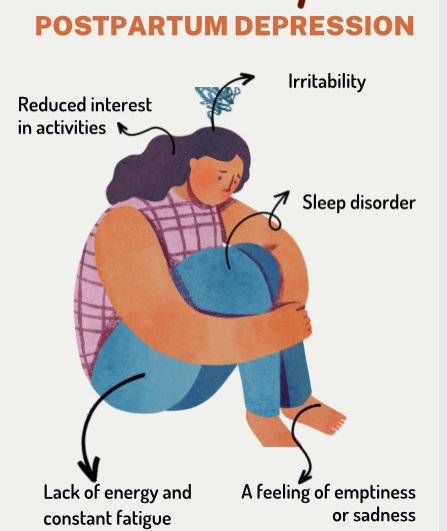Steem greetings @everyone and welcome to my blog as I share about postpartum depression. I know this is something strange to many maybe because it's your first time hearing about such a topic.

Many women after birth suffer from severe postpartum depression to the extent that some victims end up losing their lives by either dyeing in silence or personally committing suicide. To raise awareness about this predicament suffered by women, I decided to do this write-up today. I will share ideas based on My experience working as a social worker within my community and also share my life experiences as well.
| Understanding Postpartum Depression |
|---|
Permit me to share my understanding of what Postpartum Depression is all about. I can say it is a form of depression suffered mostly by women after childbirth. However, some men also suffer from this but rare to find.
We all know that child bearing comes with a lot of responsibility in place for both the mother and the father. And when the responsibility is shifted to one person alone, it becomes a burden. We all know how it feels to carry on a burden you are unable to withstand the weight. It gradually weighs you down to the extent that if not well managed, it can lead to a severe case. That is how it feels suffering from postpartum depression.
You have a baby at hand, you are unable to even feed yourself, the baby needs cloths, diapers, milk, toys, etc and you are unable to afford them. It puts you in a thinking mode, self-blaming, feeling neglected by your spouse or abandoned, you become stressed up instead of resting to recover from the 9 months stress since you conceived a baby. You eventually become sad because you cannot provide these basic needs for your child, and also experience mood swings.
At times you become too emotional about everything around you. You cry at any given moment. This is because you are suffering from postpartum depression.
I have worked with a case where the woman was impregnated by her boyfriend and rejected the pregnancy. With the stress during the 9 months of pregnancy and after birth unable to take care of the child. Her family also abandoned her with the baby, she suffered from severe postpartum depression to the extent that she later on suffered from lost memory till date. Literally, she has been on the streets for 24 years due to postpartum depression that was poorly managed.
| Some Symptoms of Postpartum Depression |
|---|
There are several ways to identify some of the signs that you are suffering from postpartum depression. Below are some of the signs.
- Difficulties in sleeping: normally as a mother, our sleeping patterns changes and most often we try to adapt to that of the baby. But when the baby is sleeping and you still find it difficult to sleep, it means you are suffering from insomnia which is a sign of suffering from postpartum depression.
- Crying frequently: when you cry at any given moment for no reason, that is a sign of postpartum depression.
- Loss of appetite: As a breastfeeding mother, you are supposed to eat well to be able to breastfeed the baby. When you start feeling like food is not important, that is a sign of depression.
- Weight loss or weight gain: during and after childbirth, it is common for women to gain weight but excessive weight gain or weight loss is a sign of postpartum depression.
There are several other signs which I haven't mentioned but these ones are the most common.
| What Causes Postpartum Depression |
|---|
- The first cause might be due to physical changes in the body. We know that during pregnancy our body produces lots of hormones which after childbirth, drop drastically. This caused you to fall into depression or feel weak and tired.
- Financial difficulties: This is most often the cause of many women suffering postpartum depression. As I earlier said, when it is difficult to afford the basic needs for yourself and the baby, it becomes a serious issue.
- Emotional distress: You might be having relationship issues with your partner during or after childbirth which can make you have regrets, making you feel like you have lost it all, or feel like you lost total control over your life.
- The last but not least cause can be genetical issues. If your family has a history of postpartum depression, then it's likely that you can suffer from it as well.
| Some Prevention Methods |
|---|
The following are some strategies to prevent postpartum Depression.
If your family has a history of post-partum depression, during pregnancy, open up and speak to a health provider. They can then monitor you and placed you on therapy.
After childbirth, it is always advisable to visit the hospital after 2 weeks of delivery for a proper check-up. For this reason, when it is detected early, treatment can also commence immediately.
Lastly, you do not have to blame yourself because it is not your fault. You did not decide to suffer from postpartum depression and your healing can only be effective when you stop blaming yourself.
In sum, postpartum depression is often suffered by those giving birth for the first time. However, it increases by almost 30% during the second birth. It should not be mistaken for a flaw in the character of the mother. Some fathers also suffer from postpartum depression. Therefore we need to create awareness to reduce the risk of parents experiencing this sickness. It has devastating consequences such as thoughts of suicide, loss of
Memory, etc.